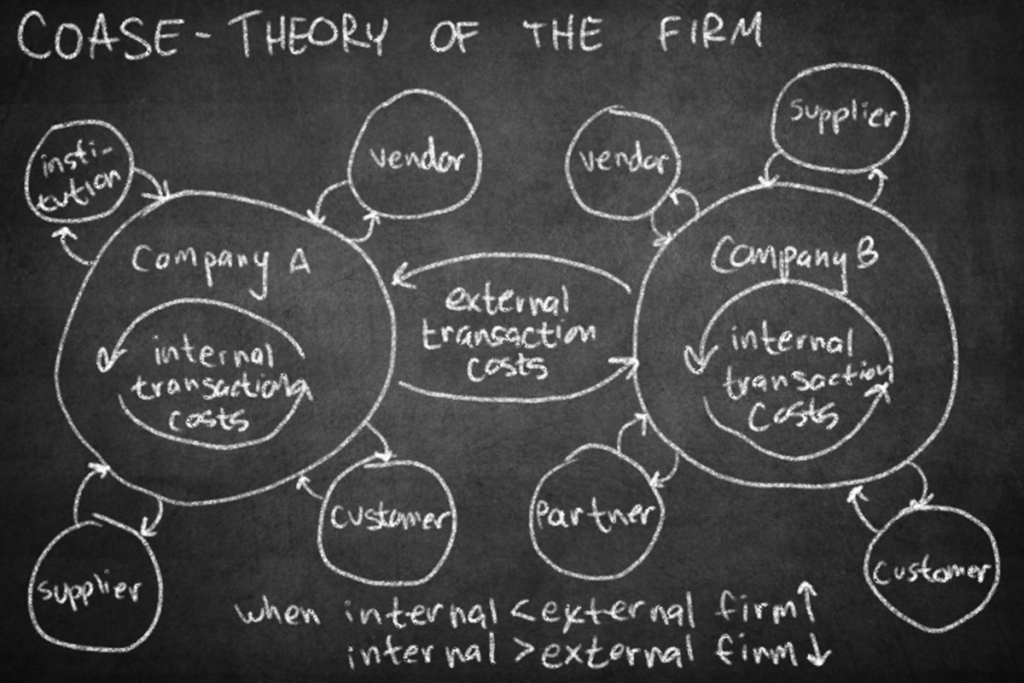The nature of work is changing rapidly. Everyone by now has heard the term “gig economy,” but few understand what it really means. The contract between people, and between firms is changing. Our conception of what companies do is centuries old, and our perceptions are rooted in outdated models.
Ronald Coase, economics professor at the University of Chicago Law School, theorized in the 1930s that the purpose of the firm was to reduce transaction costs for certain activities. In the early 1900s, it was expensive to find a trusted driver for a single trip. So firms were created to employ drivers who could be trusted to show up, drive safely, and accept an agreed upon and fair price for the work. Today, we take for granted how easy it is to use Uber or Lyft for a single trip. In fact, it’s so easy, the entire auto industry is changing.
As transaction costs are reduced, the need for traditional company constructs is reduced.
I met with a CEO recently who perceived our model as complex because people from different companies were part of our process. We have independent contractors and freelancers who do work that historically has been done by employees of a single company. People with different email addresses, and company affiliations pop up when there’s a job to be done.
At Razorhorse, we have independent contractors doing business development. They use our email system, our CRM, and tools and databases we have invested in over time. Our system organizes their work, but each contractor works wherever in the world they want. They use their own devices – PCs, Macs, smartphones and tablets. They choose whether to employ best practices we’ve identified, or develop new methods. The only rules at the end of the day are integrity, and high performance.
When we have an NDA to review, a lawyer in Colorado who is affiliated with a cloud-based legal service called InCloudCounsel does the work. When we need to do technology due diligence on a potential acquisition, a talented CTO based in the Bay Area does the work. When we evaluate the go to market capabilities of a software company, we bring in a contractor who lives in New Hampshire. When we need a logo, we run a contest through 99Designs, and designers around the globe compete to design the logo.
Each person on our team sets his or her own hours. They determine when to take vacation, and can even organize working vacations. They can work from their home town in Mississippi, or Eastern Pennsylvania and do a job that previously could only be done in New York City, Boston, or San Francisco. They can fly to a new city, rent an Airbnb, and as long as they have a high speed internet connection, they can work from the new location. I wrote this article on my iPhone on a Saturday in between errands and activities.
To someone who is accustomed to traditional business structures, this can appear confusing, and even suspect. The reality is, we have contractual relationships with everyone on our team that are more thoughtful and enforceable than the agreement an employee makes with his or her employer. We lay out the terms of confidentiality, and ensure there are meaningful repercussions for anyone who breaches the contract. We take precautions to safeguard our confidential information, and the information of others.
Most important, we maintain high standards for intellect, work ethic, and integrity. When I’ve worked in large organizations, I had far less control over maintaining high standards. I’ve had bosses who encouraged or required unethical business practices. I’ve worked with teammates who sabotaged each other. When we see that type of behavior in our network, we cut ties immediately.
The nature of work is changing. Razorhorse is on the cutting edge.

